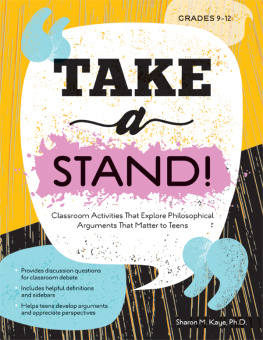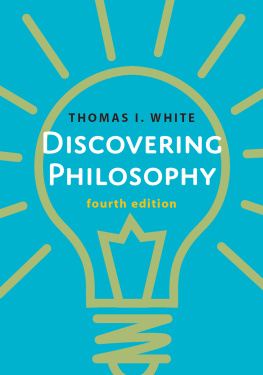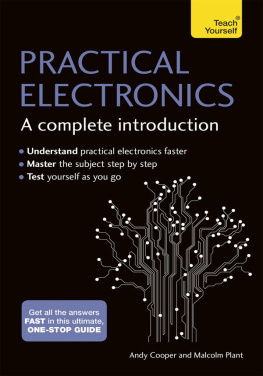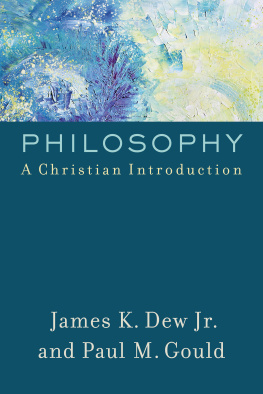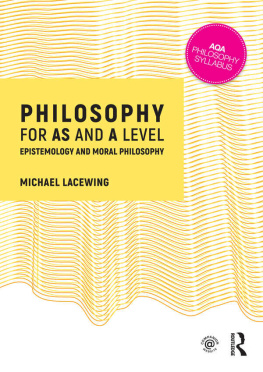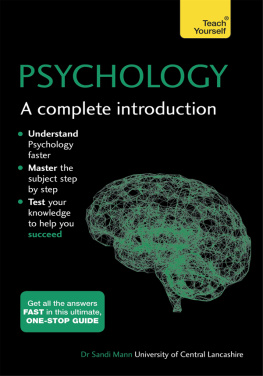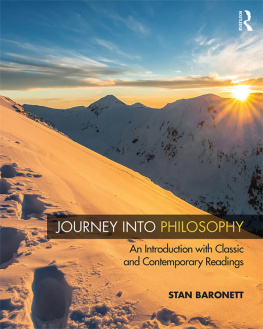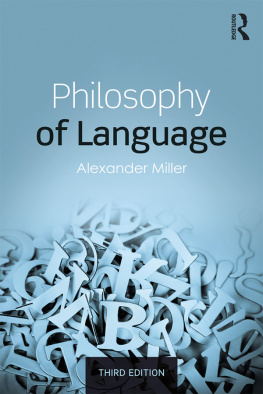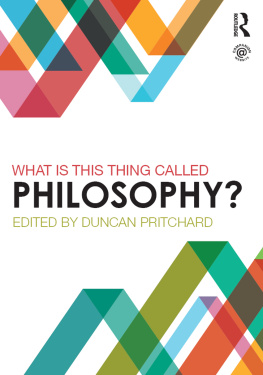For Tris, Audrey and Xavier with all my love
With special thanks to Terry Bradley
Sharon Kaye is Professor of Philosophy at John Carroll University in Cleveland, Ohio. She graduated Phi Beta Kappa from the University of Wisconsin, Madison. After receiving her PhD in 1997 from the University of Toronto, she was a Killam postdoctoral fellow at Dalhousie University in Halifax, Nova Scotia. Since then, she has published numerous articles as well as books, including Philosophy for Teens Volumes I and II with Paul Thomson (2006, 2007), Medieval Philosophy (2008), Black Market Truth, Book One of The Aristotle Quest: A Dana McCarter Trilogy (2008), Critical Thinking (2009), The Onion and Philosophy (2010), The Ultimate Lost and Philosophy (2011), and What Philosophy Can Tell You about Your Lover (2012). Her works have been published in Japanese, Greek, Turkish, Spanish, Portuguese and Slovak.
PHILOSOPHY
A complete introduction
Sharon Kaye
Contents
How to use this book This book is arranged chronologically, with each chapter focused on a key philosopher whose ideas have challenged and enlarged philosophical thought in a significant way. Each begins with a thought experiment to introduce the reader to the crux of the philosophers thought before moving on to an in-depth discussion of his ideas. |
This Complete Introduction from Teach Yourself includes a number of special boxed features, which have been developed to help you understand the subject more quickly and remember it more effectively. Throughout the book you will find these indicated by the following icons: |
| The book includes concise quotes from the philosopher under discussion in each chapter. They are referenced so that you can include them in essays if you are unable to get your hands on the source. |
| The case study is a more in-depth introduction to a related topic. There is one in each chapter, and they should provide good material for essays and class discussions. |
| The key ideas are highlighted towards the end of each chapter. If you have only half an hour to go before an exam, scanning through these would be a very good way of spending your time. |
| The fact-check questions at the end of each chapter are designed to help you ensure that you have taken in the most important concepts from the chapter. If you find that you are consistently getting several answers wrong, it may be worth trying to read more slowly or taking notes as you go. |
| The spotlight boxes offer interesting or amusing anecdotes to help bring the philosophers and their ideas to life. |
| The dig deeper boxes give you ways to explore topics in greater depth than is possible in this introductory-level book. |
Introduction
Philosophy is the most important subject you will ever study.
This may come as a surprise to you, since philosophers arent very visible in our society. They dont have offices like lawyers or counsellors, where you go and pay a fee to receive a service. Nevertheless, theyre everywhere. And its a good thing, too, because society would collapse without them.
Philosophers are people who think about things. They stop and wonder why things are the way they are. They ask questions no one else has ever considered. They dream about how things might be different.
If youve ever done any of these things, then youre probably a philosopher. Perhaps just about everyone has had philosophical moments from time to time. You can be a philosopher without any formal training. But obviously the more you know about philosophy the more philosophical you can be.
The best way to learn about philosophy is to study what great philosophers have said. Thats exactly what philosphers did they built upon their predecessors ideas. The history of philosophy is the unfolding of an extraordinarily rich legacy of thought that has underpinned the development of Western civilization.
This book is designed to help you teach yourself philosophy. The goal is not just to teach yourself about philosophy, but to teach yourself to be a (better) philosopher. Why not? We need you. And, besides, its fun.
This book will take a close look at 14 of the greatest philosophers who ever lived. We will examine their views, how they argued for them, and what their critics said about them.
Each philosopher is different. They ask different questions and have different concerns. They have very different ways of seeing the world. Yet they are all philosophers and they are united by three main themes, which you will see running throughout this book.
Theme 1: challenging authority
All the thinking that philosophers do results in some pretty radical ideas. Its not surprising, therefore, that philosophers often find themselves in deep trouble. Each of the philosophers we will meet in this book has his own tale of woe, which we can summarize as follows:
Plato was sold into slavery for offending a tyrant.
Aristotle was forced to abandon his school to avoid execution.
Anselm was twice exiled for standing up to the king.
Aquinass use of Arabic philosophy was condemned by the pope.
Descartes lived abroad without a permanent address for many years to escape the Inquisition.
Hobbes was nearly murdered by royalists and pressured to burn his own works.
Locke fled his homeland under suspicion of conspiracy.
Hume was charged with heresy and blackballed from university teaching.
Kant was reprimanded by the king and censored.
Mill was arrested in 1823 at the age of 17 for distributing information about birth control and was denied admittance to Oxford and Cambridge for refusing to take Anglican orders.
Nietzsche went insane.
Wittgenstein wrote his most important work while serving in the trenches during World War I.
Sartre was arrested for civil disobedience.
Dewey forfeited his laboratory school over a conflict with the university administration.
There are many other great philosophers as well, and they often had even more tragic stories. Consider the case of the fifth-century-CE Roman woman Hypatia, who was stoned by an angry mob just for teaching philosophy.
It takes guts to be a philosopher. Although society needs philosophers, it also hates them. This is because philosophers provoke change. Its human nature to resist change.
If you were living in the fifth century CE, especially if you were a woman living in the fifth century CE, you might just decide to pass on philosophy. We couldnt blame you. But many brave men and women didnt pass. They refused to pass. And, thanks to them, you no longer have to worry about getting stoned at least in most places around the world. You can pretty safely read this book and then go on to develop your own outrageously radical philosophy.


